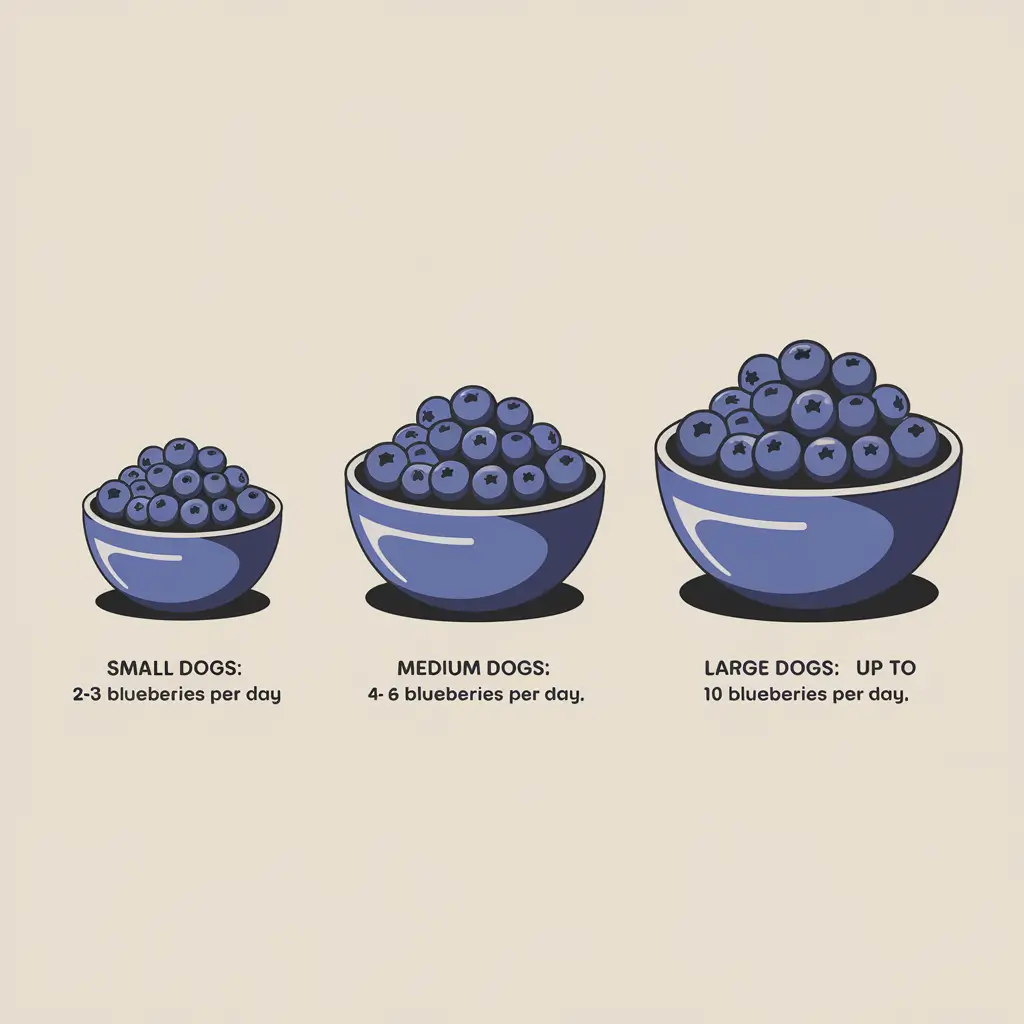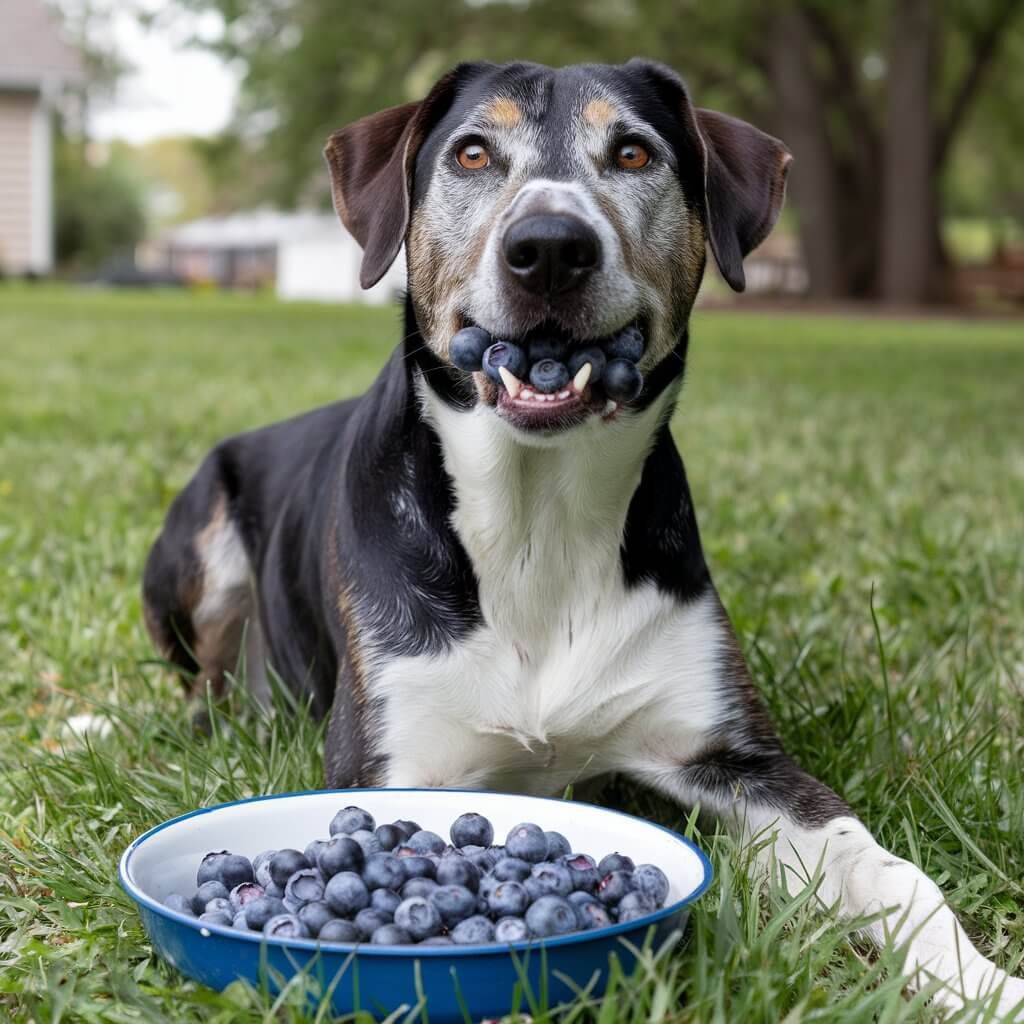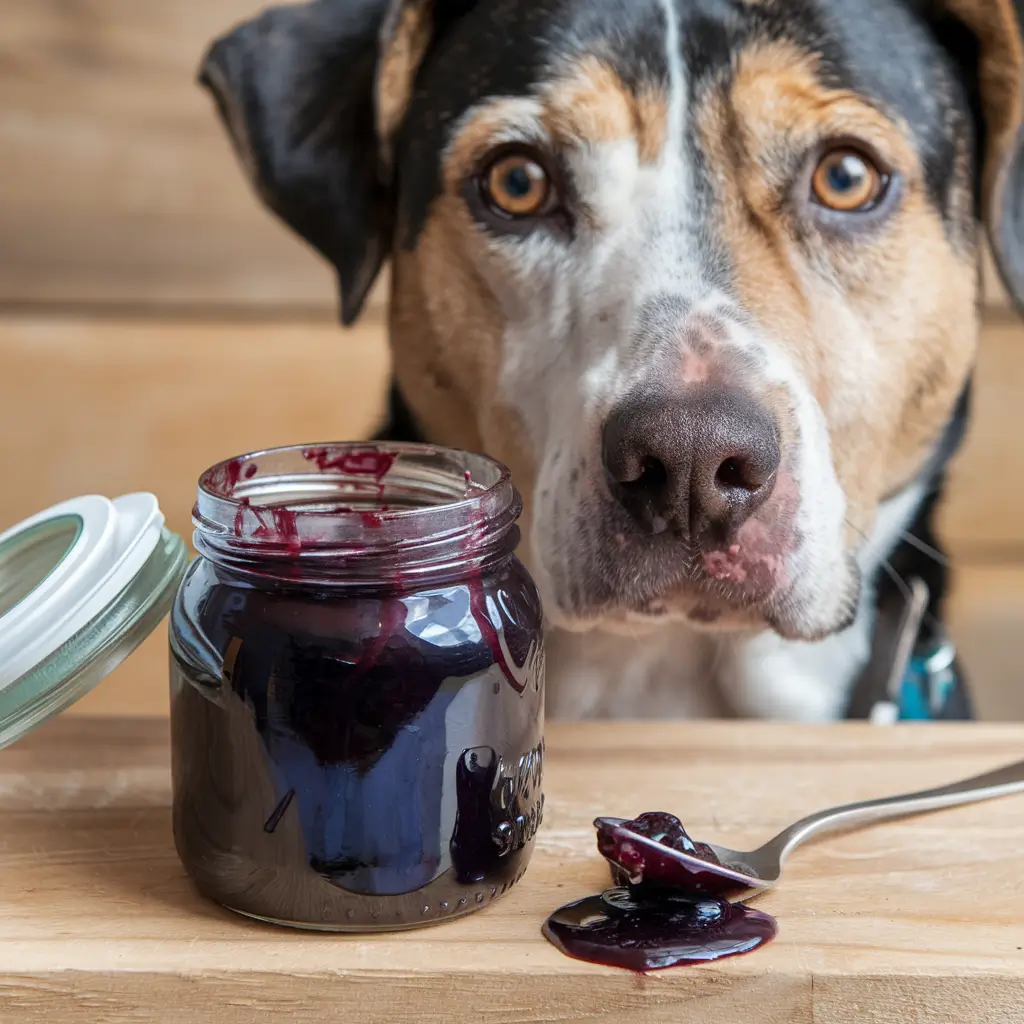Can Dogs Eat Blueberries? 5 Health Benefits of Blueberries for Dogs
As responsible dog owners, we constantly strive to provide the best nutrition for our pets. A balanced diet is essential to ensure our dogs live long, healthy, and happy lives. Many fruits and vegetables offer great health benefits to dogs, but some raise questions about their safety. Blueberries are one such fruit. So, can dogs eat blueberries? The answer is a resounding yes! Blueberries are not only safe for dogs but also provide several health benefits when fed in moderation.
Table of Contents
The Nutritional Value of Blueberries
Blueberries are packed with essential nutrients that benefit both humans and dogs. These small, juicy berries contain a wealth of vitamins, antioxidants, and fiber, all of which are important for maintaining a dog’s overall health.
Key Nutrients in Blueberries
- Vitamin C: This antioxidant helps to boost the immune system, protecting your dog from common illnesses. It also aids in collagen production, which is important for healthy skin, bones, and connective tissues.
- Vitamin K: Essential for proper blood clotting and bone health, Vitamin K helps to keep your dog’s bones strong and prevent fractures.
- Antioxidants: Blueberries are known for their high antioxidant content. Antioxidants protect your dog’s cells from free radical damage, which can lead to aging and diseases such as cancer.
- Fiber: This helps to regulate the digestive system, preventing constipation and promoting a healthy gut.
Given these nutritional benefits, blueberries can be a fantastic addition to your dog’s diet when offered appropriately.
Health Benefits of Blueberries for Dogs

Blueberries are Good for Dogs?
Brain-Boosting Benefits of Blueberries
One often overlooked benefit of blueberries is their ability to support brain health. Research suggests that the antioxidants in blueberries may help delay cognitive aging and improve memory function. This benefit applies to dogs as well. For older dogs or breeds prone to cognitive decline, such as Border Collies or Poodles, incorporating blueberries into their diet may provide a natural way to enhance brain health.
The anthocyanins, flavonoids, and other plant compounds in blueberries play a crucial role in protecting the brain from oxidative stress. This protection can help preserve cognitive function, ensuring your dog remains alert and active well into their senior years.

Blueberries and Their Role in a Balanced Diet
Remember, while blueberries are a fantastic treat, they should not replace a well-rounded and complete dog diet. Dogs thrive on a balanced diet rich in protein, healthy fats, and carbohydrates. Blueberries should be treated as an occasional supplement to this diet, enhancing the nutritional profile without detracting from the core meal.

Combining Blueberries with Other Fruits
You can diversify your dog’s fruit treats by combining blueberries with other dog-safe fruits. Some popular options include:
- Apples: Rich in fiber and vitamins, but always remove the seeds and core.
- Bananas: High in potassium, perfect for a quick energy boost.
- Watermelon: Hydrating and low in calories, just be sure to remove any seeds or rind.
- Strawberries: Another antioxidant-rich fruit that supports the immune system.
Mixing fruits can add excitement to your dog’s treat routine while offering a variety of health benefits. Always ensure the fruit is washed and prepared safely before serving.
How to Safely Feed Blueberries to Your Dog?
While blueberries are safe for dogs, there are a few important guidelines to follow to ensure your dog enjoys this superfood without any risk.
1. Feed in Moderation
Like any treat, blueberries should be fed in moderation. Too many blueberries can lead to digestive upset, particularly diarrhea. A small handful of blueberries a few times a week is sufficient for most dogs.
2. Wash Thoroughly
Before feeding blueberries to your dog, be sure to wash them thoroughly. Pesticides or other contaminants on the skin of the fruit can pose a health risk to your dog, so it’s best to clean them well.
3. Offer Fresh or Frozen
Both fresh and frozen blueberries are safe for dogs. Frozen blueberries can be a refreshing treat on a hot day or used to keep your dog occupied as they nibble on the cold fruit.
4. Avoid Blueberry-Flavored Foods
While natural blueberries are a great snack for dogs, avoid feeding them blueberry-flavored products such as blueberry muffins, yogurt, or jam. These products often contain added sugars, artificial sweeteners (like xylitol, which is toxic to dogs), and preservatives that can be harmful to your dog.

Can Puppies Have Blueberries?
Yes, puppies can eat blueberries, but it's important to introduce them gradually and in small amounts. Puppies have more sensitive digestive systems than adult dogs, so start with a few berries and observe for any signs of stomach upset. As always, consult with your veterinarian before introducing new foods into your puppy’s diet, especially if your puppy has any existing health conditions.
Blueberry Treat Ideas for Dogs
Here are a few fun and healthy ways to incorporate blueberries into your dog’s diet:
- Blueberry Dog Biscuits: Mix blueberries with whole wheat flour, a beaten egg, and a little water to create a homemade dog biscuit. Bake until golden brown, and you’ve got a nutritious treat your dog will love!
- Blueberry Smoothie: Blend blueberries with plain, unsweetened yogurt and freeze the mixture into ice cube trays for a delicious dog-friendly smoothie. This can be a great summer treat to help keep your dog cool.
- Top Their Regular Food: Add a few blueberries on top of your dog’s regular kibble for an extra burst of flavor and nutrition. Just a small amount of blueberries can make their meal more exciting.

Why Blueberries Are Better Than Processed Treats
Many commercial dog treats are high in artificial flavors, preservatives, and unhealthy fats. In contrast, blueberries are a natural, low-calorie snack with no added chemicals. They provide essential nutrients without the risk of obesity or related health issues, making them a superior alternative to processed treats. Moreover, they are easy to serve, require no preparation, and can be enjoyed right out of the refrigerator or freezer.
Dental Health and Blueberries
While blueberries are not a substitute for dental care, their natural sweetness and juice can be appealing to dogs. Chewing on frozen blueberries, for instance, may have a slight abrasive effect on the teeth, helping to remove minor plaque build-up. However, always ensure that your dog has access to proper dental care, including regular brushing and vet check-ups.
How Many Blueberries Can Dogs Eat?
When it comes to feeding your dog blueberries, moderation is key. Blueberries should be considered a treat, not a meal replacement. As a general guideline:
- Small Dogs: 2-3 blueberries per day
- Medium Dogs: 4-6 blueberries per day
- Large Dogs: Up to 10 blueberries per day
Feeding too many blueberries at once can lead to digestive issues, including diarrhea or an upset stomach. It’s important to watch your dog’s reaction when trying new foods and adjust the quantity as needed.

Can Dogs Eat Blueberries Every Day?
Yes, dogs can eat blueberries daily, but it’s essential to feed them in moderation. Blueberries are packed with nutrients like antioxidants, fiber, and vitamins that promote overall health. However, even healthy foods can become problematic if overfed. Depending on your dog’s size and dietary needs, a small handful of blueberries may be a safe daily treat. Always consider your dog’s weight and calorie requirements, and avoid using blueberries as a substitute for balanced, high-protein dog food.


Could My Dog Be Allergic to Blueberries?
Although rare, some dogs may be allergic to blueberries. Signs of an allergic reaction include itching, swelling, hives, difficulty breathing, or gastrointestinal upset. If you notice these symptoms after feeding your dog blueberries, stop immediately and consult a veterinarian. Allergic reactions in dogs can vary in severity, so it’s crucial to act quickly if you observe anything unusual Noble Vet Clinics. Always consult your veterinarian before introducing new foods, especially if your dog has pre-existing health conditions or dietary sensitivities.
What If My Dog Has Eaten Too Many Blueberries?
If your dog consumes too many blueberries, they may experience digestive issues such as diarrhea, vomiting, or gas. The natural sugars in blueberries could also pose a risk of weight gain and dental problems if given excessively over time. In cases of overconsumption, monitor your dog for signs of discomfort and ensure they stay hydrated. If symptoms persist or worsen, seek veterinary care immediately. The sugar content and fiber in large amounts could strain a dog’s digestive system.

Can Dogs Eat Other Blueberry Products?
Yes, dogs can eat some blueberry-based products, but you need to be careful and selective about what you offer them. Here's a guide to various blueberry products and their suitability for dogs:






1. High Sugar Content
Blueberry Pop-Tarts are loaded with sugar, which can lead to weight gain, diabetes, and dental problems in dogs. High sugar intake is harmful and can cause a spike in blood sugar levels, making it particularly dangerous for dogs with pre-existing health conditions.
2. Artificial Flavors and Preservatives
Pop-Tarts often contain artificial flavors, colorings, and preservatives, none of which are good for your dog’s health. These additives can cause allergic reactions or digestive upset.
3. Frosting and Artificial Sweeteners
The frosting on Pop-Tarts can contain artificial sweeteners, and some, like xylitol, are extremely toxic to dogs. Even a small amount of xylitol can cause severe hypoglycemia (low blood sugar), liver failure, or even death in dogs.
4. Unhealthy Fats and Oils
The trans fats and oils used in Pop-Tarts are not suitable for dogs. Consuming these unhealthy fats can lead to pancreatitis and contribute to long-term heart and weight-related issues.


How To Encourage a Dog to Eat Blueberries?
If you want to encourage your dog to eat blueberries, here are some helpful steps:


When to Avoid Feeding Blueberries to Your Dog?
While blueberries are safe for most dogs, there are situations where you should refrain from offering them:
- Pre-existing Allergies: Dogs with known fruit allergies should avoid blueberries unless cleared by a vet.
- Digestive Disorders: Dogs with sensitive stomachs or conditions like inflammatory bowel disease (IBD) may not tolerate the fiber content well.
- High-Sugar Diets: If your dog is already consuming fruits or high-sugar treats, be cautious to avoid an excess intake.
If your dog has a health condition that affects their diet, always consult with your veterinarian before introducing new foods, including blueberries.

Are Blueberry Plants Toxic to Dogs?
Blueberry plants, particularly the berries themselves, are generally not toxic to dogs. The berries are considered safe and nutritious, offering antioxidants, fiber, and vitamins that can support a dog’s health when fed in moderation. However, caution is advised regarding the rest of the plant. While the berries are fine, other parts of the plant, such as the leaves and stems, could potentially upset a dog’s stomach if consumed in significant amounts. This is due to the fibrous and indigestible nature of those plant components, though there is no major toxicity risk reported for blueberry plants.
Most reputable sources, including veterinary and extension offices, emphasize that dogs are typically more susceptible to harm from known toxic plants such as oleander, sago palm, or hydrangea, which are much more hazardous than blueberry bushes
Keep Pets Safe From Dangerous Home and garden Plants
What's Happening Around Florida
For the best safety practices, we recommend supervising dogs around any plants and ensuring they don’t excessively chew or ingest plant parts that may cause discomfort. Always consult a veterinarian if you suspect your dog has consumed a non-food plant material or if they show signs of distress.

Can Dogs Eat Blueberries?
What USA Top Medical Universities Says about it !
Yes, dogs can safely consume blueberries, and studies have shown the potential health benefits of this fruit for our canine companions. Here’s a breakdown of the current understanding, supported by research and data from respected veterinary institutions and medical research bodies.
Health Benefits of Blueberries for Dogs
Blueberries are rich in antioxidants, which can help combat cellular damage and may slow down age-related mental decline in dogs. Research from institutions like Tufts University indicates that antioxidants can have a neuroprotective effect, potentially benefiting older dogs or those at risk of cognitive dysfunction.
They are also loaded with essential vitamins and minerals, such as vitamin C, vitamin K, potassium, and magnesium, which support various bodily functions. For example, vitamin K aids in blood clotting and bone health, while magnesium helps with muscle and nerve function Noble Vet Clinics.
Potential Hazards
While blueberries are generally safe, overconsumption can lead to gastrointestinal upset or increase the risk of obesity due to their sugar content. In rare cases, some dogs may experience allergic reactions, which can manifest as skin irritation or digestive distress.
Furthermore, it’s important to wash blueberries thoroughly to remove any pesticide residues, as these chemicals could be harmful to your dog.

Medical Research Insights
Research from veterinary nutrition labs, such as the studies referenced by Hepper and Noble Vet Clinic, suggests that moderate inclusion of blueberries in a dog’s diet is beneficial. Blueberries provide nutrients that align with the Association of American Feed Control Officials (AAFCO) dietary guidelines, although they should not replace the protein-centric components of a dog’s diet.
Additionally, the antioxidants in blueberries may help mitigate the negative impact of oxidative stress, contributing to overall health.
How to Source Fresh and Organic Blueberries Where You Live
Sourcing fresh and organic blueberries can be easier than you might think, and finding the best quality berries can benefit both you and your dog. Here’s how to find fresh, organic blueberries in your area:

Tips for Selecting Fresh Blueberries

Storing Blueberries For Your Dog
- Look for blueberries that are firm, plump, and deep blue with a frosty, white coating called the “bloom,” which protects the fruit.
- Avoid berries that are mushy, shriveled, or have signs of mold.
- If you are buying in bulk, make sure to inspect the bottom of the container for any signs of spoiled berries.
- To keep blueberries fresh, store them in the refrigerator and wash them only when you are ready to eat or use them. They typically last for about a week when properly stored.
- If you have an abundance of blueberries, consider freezing them for later use. Spread them in a single layer on a baking sheet, freeze until solid, and then transfer to an airtight container.
What Other Fruits Are Good for Dogs?
Several fruits are safe and healthy for dogs to enjoy in moderation. These fruits can provide vitamins, minerals, antioxidants, and hydration, making them a nutritious treat. Here are some dog-friendly fruits:
Fruits to Avoid
Not all fruits are safe for dogs. Here are some fruits to avoid:
While many fruits are safe and healthy for dogs, always introduce new fruits slowly and in moderation. Be sure to remove any seeds, pits, or tough skin that may pose a choking hazard or contain harmful substances. If you are ever unsure about a fruit’s safety or have concerns about your dog’s diet, consult your veterinarian.
Can Dogs Eat Blueberries
Conclusion: Are Blueberries Good for Dogs?
Blueberries are not only a tasty and safe treat for dogs but also offer numerous health benefits, including improved immune function, better digestion, and enhanced cognitive health. As with any treat, moderation is key. Introduce blueberries gradually and consult your veterinarian if you have any concerns.
FAQs About Can Dogs Eat Blueberries
Can dogs safely eat blueberries?
How many blueberries can I give my dog?
Are blueberry-flavored products safe for dogs?
Can blueberries help with my dog’s health?
Can Puppies Eat Blueberries?
Are Blueberries Safe in All Forms?
How to Store Blueberries Safely
Are there any risks to feeding dogs blueberries?
Latest Posts!
What Citrus Is Toxic to Dogs? Top 4 Types That Are Toxic
Dogs are curious creatures, often eager to explore their surroundings, including the food we eat. While many fruits are safe for dogs in moderation, the question arises: What citrus is toxic to dogs? The answer lies in citrus fruits such as lemons, limes, and grapefruits, which contain compounds that can be harmful to your canine…
Can Dogs Eat Clementines? 8 Powerful Nutritional Benefits
Can Dogs Eat Clementines? Yes, dogs can eat clementines in moderation. These juicy, sweet citrus fruits are safe for dogs when given in small amounts. However, it’s important to ensure your furry friend doesn’t consume too much, as the natural sugars and acidity in clementines can upset their stomach. Always peel the fruit, remove the…
Can Dogs Eat Honeydew Melon? 3 Powerful Ways to Safely Feed Honeydew Melon
Honeydew is a sweet and juicy fruit that many humans enjoy, but as responsible pet owners, we often wonder, Can dogs eat honeydew melon? are safe for our dogs. If you’ve ever thought about offering honeydew to your dog, this article will provide you with detailed and comprehensive information. We’ll dive deep into whether dogs…
Can Dogs Eat Apples? 3 Amazing Health Benefits of Apples for Dogs
As pet owners, we often find ourselves wondering about the safety of human foods for our furry companions. One such question that frequently arises is, “Can dogs eat apples?” Apples are known for their nutritional benefits in humans, but are they equally beneficial for dogs? Let’s delve into the details of this crunchy fruit and…
Can Dogs Eat Apple Skin? 4 Impressive Nutritional Benefits
When it comes to treating our beloved canine companions to fresh fruits, many of us wonder about the safety of feeding specific parts, such as apple skin. In this detailed guide, we will answer the question, Can Dogs Eat Apple Skin? and discuss whether it’s safe for your dog to consume. We will also explore…
Can Dogs Eat Cantaloupe? 6 Powerful Benefits That Prove Cantaloupe Is Great for Dogs
When it comes to sharing human food with our furry friends, it’s important to ensure their safety and well-being. One common question pet owners ask is, “Can dogs eat cantaloupe?” The short answer is yes, but there are specific details and precautions you need to be aware of before offering this juicy fruit to your…


















